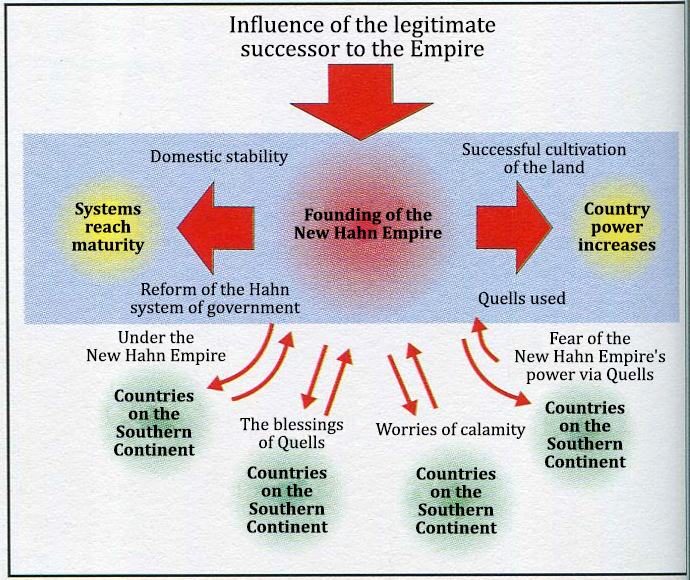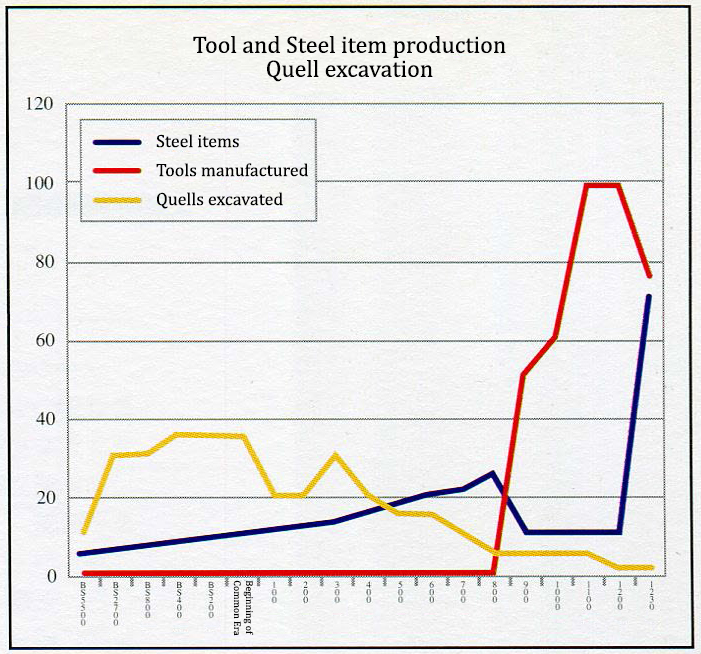Tool Culture
<Middle Age of Spell Culture>
[ Added 10/08/21 ]
| 465 |
Fall of the Hahn Empire |
|
| 470 |
New Hahn Empire (Na) established on the Southern Continent |
On the Southern Continent, the City-State of Gruegel is founded at the basin of the Inner River by the descendant of the Five Great Emperors. This new Empire is declared to be the legitimate successor of the Hahn Empire. |
| 473 |
The Anti-Imperial Coalition dissolves |
The Anti-Imperial Coalition had originally formed to overthrow the Hahn Empire. It remained in the Central Plains to pick up the pieces, but fell apart after conflicting opinions among the lords. |
| c. 500 |
Massive outbreak of monsters in the Central Plains on the Eastern Continent |
A swarm of monsters springs forth from the ruins of the Old Battleground in the Central Plains. People gradually relocate from the area to avoid the threat. |
| 520 |
Warring Nations Era in Merchmin |
After the collapse of the Empire, many nobles and feudal lords fought amongst themselves. As reorganization of the region continued, the smaller countries of Merchmin fell into chaos. |
| 547 |
Southern Continent united under the New Empire |
|
| 580 |
Kingdom founded in the Grand Teille |
The collapse of the Empire caused a mass restructuring of the nation. Many intellectuals emigrated and established a new type of monarchy which maintained good relations with the people. |
| c. 600 |
The Southern Continent begins to prosper |
|
| 604 |
The last of the feudal lords leaves the Central Plains |
The last of the feudal lords breaks ties with the Central Plains after the monster outbreak made the region uninhabitable. With no one left to rule, the Central Plains became Lordless Land. |
| c. 800 |
Tools invented, development begins in Vogelang |
Under the New Empire, the Southern Continent began to flourish and Quell research progressed. Eventually, Tools were invented in the remote region of Vogelang. |
| 841 |
Gustave Eugene born in the Merchmin Region |
|
| 897 |
Gustave Eugene becomes Marquis of Berth |
In the Merchmin Region, where the local warlords continued to fight amongst themselves, a lowly infantryman named Gustave Eugene gains control of Thermes and becomes Marquis of Berth. |
| 952 |
The New Empire is abolished and renamed. Now called “Na”, it becomes a loose unification of nations. |
The New Empire established on the Southern Continent is abolished and becomes a new Kingdom named “Na”. The governmental system also changes to that of a loose unification of nations. |
| c. 1000 |
Merchants bring many Tools to the Eastern Continent |
As the Southern Continent settled and traded with the Eastern Continent, both regions began to prosper. Merchants begin exporting Tools from the Southern Continent to the Eastern Continent. |
| 1085 |
Naval Battle of Finney – The Berth Armada defeats Otto |
|
| 1087 |
Successful invasion of Finney Island by Gustave VIII, Marquis of Berth |
|
| 1088 |
Finney Kingdom established |
Gustave VIII, Marquis of Berth, acquires Finney Island and establishes the Kingdom of Finney. He fights the other Marquises, beginning his campaign to conquer Merchmin. |
| 1195 |
Gustave XII born |
|
| 1202 |
Gustave XII completes the Firebrand ceremony |
|
♦ Governmental Shift (400’s 〜 700’s) ♦
The Anti-Imperial Coalition which overthrew the Empire remained in the Central Plains to look for solutions. However, without a common enemy to oppose, the Coalition quickly fell apart. As a result, the Eastern Continent fell into another war-torn era in the year 473.
Worldwide Restructuring
400’s 〜 500’s
To avoid the fighting in the central part of the Eastern Continent, people went north to Merchmin, south to the Grand Teille, and even crossed to the Southern Continent. This caused societal changes and the restructuring of classes across the world.
The influx of intellectuals to the southern part of the Grand Teille led to the creation of a monarchical system which maintained good relations with the people. In the north, the former nobles of the Empire who moved to Merchmin reorganized and established new smaller countries. And those who moved to the Southern Continent used the power of Quells to rebuild, then proceeded to absorb the surrounding countries.
Establishment of the New Empire
470
About 50 years before the worldwide restructuring, the descendant of the Five Great Emperors had moved to the Southern Continent and settled near the Inner River, which flows toward the heart of the continent. He initially lived only with his family, cultivating the arid soil exposed in the rocky landscape. Later, as the Empire weakened, many people moved there and it became a City-State. The increase in population and the clearing of more land allowed the region to prosper.
As the newly reclaimed Zuug Plains yielded bountiful harvests, the City-State of Gruegel was born. Naturally, this was made possible thanks to the power of Quells brought from the Eastern Continent.
In 470, the descendant was informed by his vassals of the Empire’s fall. He then declared himself the legitimate successor and built the New Empire. After bringing many of the surrounding countries under its control, the New Empire became the Unified Kingdom in 574.
♦ Development of Spells on the Southern Continent (800’s – 900’s) ♦
As the Southern Continent entered an era of stability under new leadership, the number of immigrants from the Eastern Continent increased. They brought with them Quells and spell knowledge, which lead to a new branch of research on the Southern Continent.
The Invention of Tools
c. 800
Quell research on the Southern Continent reaches a conclusion (see the Summary of the History of Quells below). Around the year 800, in the town of Vogelang in the New Empire, substitutes for Quells which functioned as foci for Anima were invented: Tools. New Spells that could be cast from Tools became popular among the common folk who did not have Quells and this knowledge quickly spread across the entire Southern Continent. This led to the establishment of a new social system.
The Development of Tools
900’s
The phenomenon of using Spells via Tools greatly enriched the lives of the general populace on the Southern Continent. Originally, the people of the Southern Continent had no Quells to rely on and could only use normal tools crafted by their own hands. Spells utilizing Tools for everyday tasks quickly permeated daily life. The possibilities were endless and combinations of normal tools and Spell Tools continued to be developed. These conveniences eased life for the people, which stimulated commerce.
♦ Height of Tool Culture (1000 〜 1200) ♦
The invention of Tools further increased the prosperity of the Southern Continent. These Tools which eased the life of the people were the primary export and stimulated foreign trade. By the year 1000, ships quickly travelled between the Eastern and Southern Continents, turning the voyage into a popular trade route. This brought a myriad of Tools to the Eastern Continent.
Finney Kingdom established
1088
Imported Tools quickly spread and were available across the entire Eastern Continent within a few generations. There was a small movement by the ruling classes who earned their social positions through possession of Quells to stop Tools from spreading to the west, but the common folk had already taken to them with unnatural speed and ease. Among them, the Kingdom of Finney was quick to adopt Tools for military use.
Finney used Tools to make their military forces stronger than any other. Though inferior in quality compared to Quells, Tools overwhelmed in sheer quantity and troops equipped with them wiped out the forces of the nearby feudal lords, laying the foundation for building the Kingdom of Finney.
Ethics of the Ruling Class
The fall of the Empire had a huge impact on areas which once again fell under the rule of the Imperial ruling classes and on countries which kept the same form of Imperial government. This could mostly be seen in the countries of Merchmin in the northern region, but they were working toward creating a new system with better relations between the ruling classes and the general populace.
One example was to have the ruling class take an Oath to strictly follow the rules and focus on the local government. The Oath placed emphasis on upholding societal morals and worked in part to prevent the spread of corruption among the ruling classes.
This did little to stop hostilities between the nations themselves, however, and the ensuing wars only added to the confusion.
Harmful Effects of Tool Culture
The incorporation of Tools into daily life led to unintended harmful effects. The societal structure was in a stable period with the new Oaths in place and allowed for steady growth, but those who could not use Spells, the “Ungifted”, were left behind and began to be persecuted as outcasts.
Though this oppression did not happen on the Southern Continent since the culture originally utilized mundane tools, the Ungifted were unable to function in ordinary life on the Eastern Continent.
■ Summary of the History of Quells
The Invention of Tools
As the Empire became increasingly unstable, the number of immigrants to the Southern Continent increased. In the year 400 especially, when the blood relative of the Five Great Emperors left for the Southern Continent, commoners and nobles alike followed suit. Naturally, Quells and the knowledge of how to use them were also brought to the Southern Continent. Up until this point, there were no such relics on the Southern Continent nor Spells which involved the use of Quells. This is thought to be the result of the land becoming arid in the days of previous civilizations. It was to this kind of environment that Quells were introduced.
● 500’s
Quells exhibit tremendous power. It was only natural that the ruling classes on the Southern Continent wanted to harness that power for themselves and went to great lengths to obtain Quells. However, there was just one problem. The Quells that were snatched up could not be used by some people who were native to the Southern Continent.
This phenomenon sparked new research among immigrants from the Empire. After much study and various experiments, a hypothesis was suggested: “If Anima is the power source for Spells, then an object functioning as a medium is needed to draw upon the power of Anima.”
The mere thought that Spells could be used without Quells was revolutionary. This was a huge threat to the nobles and those who benefitted from possessing Quells, so they used various means to suppress the information. However, this did not work in Gruegel since it was already ruled by moderates. In fact, the attempted suppression actually had the opposite effect and encouraged Spell research under protection of the State.
● 700’s
Research continued to progress, eventually moving to the manufacturing of imitation Quells. This was an experiment of Humans trying to create Quells by their own hand. However, the path forward was not an easy one and research came to a standstill after several failed experiments. It was around that time that a vein of resonant stone was discovered in the outskirts of Vogelang. Resonant stones are minerals that react with Anima. Using these stones as mediums allowed research to break through the barrier.
● 800’s
Then around the year 800, in the city Vogelang on the outskirts of the New Empire, many hardships were overcome and Tools were invented as mediums that could be used as replacements for Quells. The new Spells that utilized Tools were called “General Spells”. They spread through the populace among those who did not own Quells and a new societal system was established.

